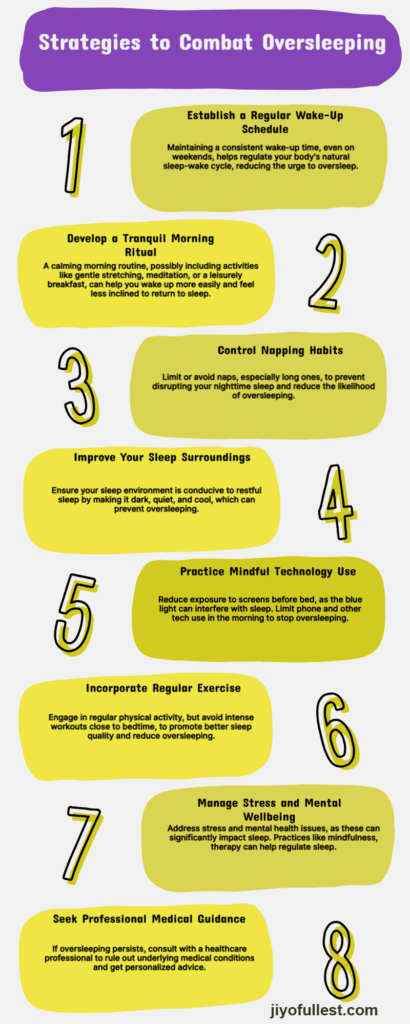Most people worry about getting too little sleep — but what happens when you’re getting too much? Oversleeping can be just as damaging as sleep deprivation, leading to health issues, low energy, and disrupted daily routines.
If you find yourself constantly hitting the snooze button, waking up groggy after 9–11 hours of sleep, or struggling to stay awake during the day even after a full night’s rest, it’s time to take action. In this article, we’ll explore why oversleeping happens, how it affects your body, and practical steps to fix your sleep schedule.
Table of Contents
ToggleWhy Do People Oversleep?
Oversleeping, or hypersomnia, isn’t just about being lazy or undisciplined. It can stem from several underlying causes:
Poor Sleep Quality: Even if you’re in bed for 10 hours, disruptions like sleep apnea, restless leg syndrome, or stress can prevent restorative sleep, making you feel tired.
Mental Health Issues: Depression and anxiety are closely linked to changes in sleep patterns, including sleeping too much.
Lifestyle Habits: Inconsistent sleep times, excessive napping, and late-night screen use can confuse your body’s internal clock.
Physical Health Conditions: Chronic illnesses like hypothyroidism, heart disease, and chronic fatigue syndrome often cause increased sleep needs.
Medications: Some medications, especially for depression, anxiety, or allergies, have drowsiness as a side effect.

How Oversleeping Affects Your Health
While an occasional long night’s sleep after exhausting days is normal, chronic oversleeping can lead to:
Weakened Mental Health: Increases the risk of depression, anxiety, and memory problems.
Higher Risk of Disease: Linked to obesity, diabetes, heart disease, and stroke.
Reduced Cognitive Function: Leads to brain fog, difficulty concentrating, and poor decision-making.
Low Energy Levels: Ironically, sleeping too much can make you feel even more fatigued.
Disrupted Circadian Rhythm: Makes it harder to maintain a healthy, consistent schedule.
In short, oversleeping doesn’t just waste hours — it drains your health and vitality.
Signs You Might Be Oversleeping
Here’s how to tell if you’re getting too much sleep:
You regularly sleep more than 9–10 hours and still feel tired.
You have trouble waking up even after long sleep.
You nap frequently during the day.
You experience low motivation, energy, and focus.
You feel guilty, anxious, or frustrated about your sleep habits.
If these sound familiar, don’t worry — fixing your sleep is completely possible with some smart adjustments.
How To Stop Oversleeping: 8 Proven Strategies

1. Set a Consistent Wake-Up Time
No matter what time you go to bed, get up at the same time every day, even on weekends. This helps reset your internal clock (circadian rhythm) and stabilizes your energy levels.
2. Create a Relaxing Morning Routine
Instead of lingering in bed, get up and start moving. Stretch, meditate, drink water, and expose yourself to natural sunlight as soon as you wake up to signal your body that it’s time to be alert.
3. Limit Napping
While short naps (20–30 minutes) can be refreshing, frequent or long naps can disrupt your nighttime sleep, creating a cycle of oversleeping.
4. Optimize Your Sleep Environment
Make your bedroom a sanctuary for quality sleep:
Keep it cool (around 65°F or 18°C)
Use blackout curtains
Remove electronic distractions
Invest in a comfortable mattress and pillow
5. Use Technology Mindfully
Track your sleep with apps or wearables to monitor patterns. Some apps offer smart alarms that wake you during lighter sleep phases, making it easier to get up.
6. Exercise Regularly
Physical activity, especially in the morning or early afternoon, boosts energy levels and improves sleep quality at night. Aim for at least 30 minutes of moderate exercise most days.
7. Manage Stress and Mental Health
Chronic stress and depression can both lead to oversleeping. Incorporate mindfulness, journaling, therapy, or breathing exercises into your daily routine.
8. Seek Medical Advice if Needed
If you’re doing everything right but still oversleeping or feeling exhausted, consult a healthcare provider. Conditions like sleep apnea, thyroid issues, or mood disorders may require professional treatment.
Correcting Sleep: A Simple 7-Day Plan
| Day | Focus |
|---|---|
| Day 1 | Set a fixed wake-up time and stick to it. No exceptions! |
| Day 2 | Cut naps to under 30 minutes or eliminate them. |
| Day 3 | Expose yourself to sunlight within 30 minutes of waking. |
| Day 4 | Start a morning ritual (meditation, journaling, exercise). |
| Day 5 | Avoid screens 1 hour before bed and wind down mindfully. |
| Day 6 | Maintain consistent sleep/wake times, even on weekends. |
| Day 7 | Evaluate your progress and adjust as needed! |
Consistency is key. Your body craves rhythm — give it time to adjust, and you’ll start to feel more energized naturally.

Frequently Asked Questions (FAQ)
Why Am I Sleeping So Much All of a Sudden?
Feeling like you’re in a sudden-onset slumber party with no end in sight can be confusing and concerning. While it’s tempting to blame a “sleep debt,” a sudden increase in your sleep needs can signal underlying issues.
One of the most common culprits is stress. When you’re under significant mental or emotional pressure, your body and mind need more time to process and recover, and sleep is the primary way this happens. Illness, even something as simple as the flu or a cold, can also cause you to feel more tired as your immune system works overtime.
Other factors to consider include lifestyle changes, like a new exercise routine or a demanding job, and changes in your environment, such as a new medication or seasonal changes (Seasonal Affective Disorder or SAD can cause you to feel more tired during darker months).
Why Am I Still Tired After 12 Hours of Sleep?
Waking up feeling exhausted after a marathon sleep session is a frustrating paradox. The idea that “more sleep is always better” isn’t necessarily true. While it might seem counterintuitive, oversleeping can actually disrupt your body’s natural sleep-wake cycle, leading to what’s often called “sleep inertia.”
This groggy feeling is your brain struggling to wake up after being in a deep sleep for an extended period. Oversleeping can also be a symptom of a deeper issue, such as sleep apnea, where your breathing is interrupted throughout the night, preventing you from getting restorative sleep. Other conditions, like thyroid problems, anemia, or even depression, can cause persistent fatigue regardless of how much you sleep.
It’s also worth considering the quality of your sleep. If your sleep environment is noisy, too hot, or if you’re frequently waking up, you might not be getting the deep, restorative sleep your body needs, even if you’re in bed for a long time.
How to Stop Oversleeping When Depressed
Depression and oversleeping are often intertwined, creating a vicious cycle. Depression can make you feel a lack of energy and motivation, making the prospect of staying in bed far more appealing than facing the day.
Breaking this cycle requires a multi-faceted approach. One of the most effective strategies is to establish a consistent sleep schedule, even on weekends. Aim for a specific wake-up time and stick to it, even if you don’t feel like it. This helps regulate your body’s internal clock and can improve your overall sleep quality.
Light exposure is another powerful tool. Getting sunlight shortly after waking up can signal to your brain that it’s time to be alert. This can be as simple as opening your curtains or spending a few minutes outdoors.
Physical activity, even a short walk, can significantly improve your mood and energy levels. It’s a natural antidepressant and can help you feel more tired at the end of the day, leading to better quality sleep.
Finally, talk to a professional. A therapist or a doctor can help you address the root causes of your depression and develop a personalized plan that includes strategies for managing your sleep. They can also rule out any other medical conditions that might be contributing to your oversleeping.
Is oversleeping worse than not getting enough sleep?
Answer: Both oversleeping and sleep deprivation carry health risks. Chronic oversleeping is associated with obesity, diabetes, and depression, while sleep deprivation can lead to cognitive impairments and a weakened immune system. Balance is crucial.
How many hours of sleep do adults really need?
Answer: Most adults need 7–9 hours of quality sleep per night. Individual needs may vary slightly, but sleeping consistently longer than 9–10 hours could signal a deeper issue.
Can changing my diet help correct oversleeping?
Answer: Absolutely. Eating a balanced diet rich in nutrients supports better energy levels and sleep quality. Avoid heavy meals close to bedtime and limit caffeine and sugar intake.
Why do I still feel tired after sleeping 10 hours?
Answer: Feeling tired after long sleep could result from poor sleep quality (fragmented sleep), underlying health problems (like sleep apnea), or disrupted circadian rhythms. Addressing lifestyle habits and seeking medical advice can help.
How long does it take to fix a sleep schedule?
Answer: With consistent effort, many people start seeing improvements within one to two weeks. However, deeper underlying issues may take longer and might require professional help.
Final Thoughts
Oversleeping is more than just “sleeping in” — it can be a hidden sign that your body and mind need attention. Thankfully, with simple, steady changes to your habits, environment, and lifestyle, you can reset your sleep pattern and reclaim your mornings full of energy and purpose.
Remember: It’s not about sleeping more or less — it’s about sleeping better.


